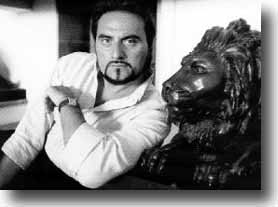This page was last updated on: June 17, 2007
INTERVIEW

Tenor's `Boheme' Role Is His Life
Wynne Delacoma, The Chicago Sun-Times, 20 January 1993
He started out as a choirboy in one of Rome's most prestigious church choirs. Then he fell in love with the electric bass and spent his time playing rock 'n' roll and jazz fusion. At age 17, he entered Rome's Accademia di Santa Cecelia to study classical double bass. He was soon playing professionally and spent six years as a bassist with Rome's RAI orchestra.
Now, in his early 30s, Giuseppe Sabbatini is in his latest musical incarnation, a tenor appearing as Rodolfo in Lyric Opera of Chicago's production of Puccini's "La Boheme." His U.S. debut will end with a performance at 7:30 p.m. Friday at the Civic Opera House.
It has been an auspicious debut for the young tenor, who has been impressing European audiences with his well-trained, expressive voice and intense acting.
Rodolfo is a role close to Sabbatini's heart.
"I have a particular feeling for `La Boheme,' " he said, sitting in his Presidential Towers living room against a backdrop of Chicago's twilight skyline. He is wearing jeans and a comfortable sweater, and his jet black beard is neatly trimmed. He apologizes for his "survival" English, though his command of the language is well above survival level.
"I am Rodolfo," said Sabbatini. "I am crazy, I am jealous, I'm a musician. On stage, I never think for a moment of how I should move or what I should do. Rodolfo and I are completely the same person."
Finding his alter ego on the opera stage was not an easy journey. Sabbatini had been strongly drawn to jazz, but felt he had to give it up to concentrate on classical double bass. Abandoning the double bass in 1985 to study voice was another difficult decision.
"Once I made the decision to study classical double bass, I closed the door on jazz," he said. "Jazz was another world."
"Then," Sabbatini continued, "my life was with my double bass. It took me six months to make the decision to study voice. But things were not so good in Italian orchestras. I was just a number, I had to punch a time card. The music was experimental. I was unhappy. Some friends of mine, my parents, knew I had a good voice. They kept saying, `Why don't you study voice?' "
Once he found the right teacher, Sabbatini made fast progress. Eighteen months after his first voice lesson as an adult, he had won two Italian competitions and made his Italian debut. In 1987, he made his La Scala debut.
"I studied like a child," he said, "I started with much humility. (My success) was a big surprise. When I was a bassist, I studied very, very hard. Every passage was learned with tears and blood. With singing, it was different. From the beginning, I had a big success."
One reason may be the depth of Sabbatini's musicianship. At the conservatory, he played with chamber ensembles, regularly performing music from Palestrina to 20th century composers. Though a professional bassist, he studied composition with an eye to perhaps becoming a conductor.
"I always say, `I am no tenor, I'm a musician,' " he said.
Sabbatini keeps close track of his schedule, which is now becoming crowded with far-flung engagements. He can tell you the day he took his first voice lesson (March 3, 1985) and the exact day he made his various debuts.
He is interested in French repertoire; the title role in Massenet's "Werther" was one of his earliest roles. In January he will be singing "The Pearl Fishers" in Rome and will give a recital. Sabbatini's 1993 schedule also includes performances in Naples, Italy; Tokyo, and at Paris' Bastille Opera, as well as a Rossini recording with Riccardo Chailly.
He laments the fact that he is on the road so much, away from his wife, soprano Daniela Dessi. But travel is a given in the operatic life. And after his long musical journey, Sabbatini appears to be hooked on opera.
"I love this life," he sighed with a weary smile. "It's like drugs."